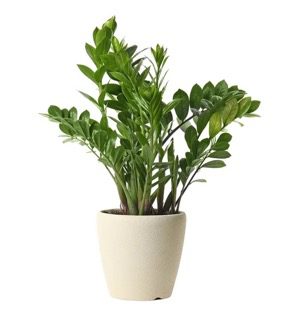
The ZZ plant is considered to be mildly toxic for dogs. It can cause vomiting, diarrhea, and stomach discomfort if consumed in large quantities. While it may not pose a life-threatening risk, it’s still important to keep the plant out of your dog’s reach. The leaves, roots, and other parts of the plant can all cause similar symptoms if eaten. If your dog eats the ZZ plant, you should monitor them closely and contact your veterinarian if they experience any adverse effects. As a precaution, it’s best to keep these plants away from dogs and other pets.
The ZZ plant, also known as Zamioculcas zamiifolia, is a perennial plant from eastern Africa that belongs to the Araceae family. It is a popular houseplant and landscaping plant due to its ease of care, ability to tolerate low light and infrequent watering, and resistance to pests and diseases. Its attractive foliage and durability also make it a popular choice for indoor and outdoor decoration.
Common symptoms of ZZ plant poisoning in dogs include vomiting, diarrhea, and stomach discomfort. Behavioral changes may include lethargy and loss of appetite. Physical symptoms and visible signs of toxicity may include drooling, pawing at the mouth, and abdominal pain. Immediate actions to take if you suspect your dog has been exposed include removing the plant from their reach and monitoring them closely. Contact your veterinarian if they experience any adverse effects. To prevent dogs from eating this plant, keep it out of their reach and consider using barriers or deterrents. If your dog eats the ZZ plant, monitor them closely and contact your veterinarian if necessary. All parts of the plant can cause similar symptoms if consumed.
Do you own a ZZ plant or are you thinking about getting one? It’s important to know that this plant is mildly toxic to dogs and can cause vomiting, diarrhea, and stomach discomfort if consumed in large quantities. To keep your furry friend safe, be sure to keep the plant out of their reach. If you’re looking for alternative houseplant options that are safe for dogs, check out our website Way Canina where you can compare different plants and find the best options for your furry friend.
If you’re a dog owner looking for safe and non-toxic indoor plant options, consider plants like spider plants, Boston ferns, and African violets. These plants are all considered safe for pets and won’t cause harm if they are ingested.
When it comes to creating a dog-friendly yard, there are a few things to keep in mind. First and foremost, be mindful of the types of plants you choose for your yard. Some common outdoor plants, such as lilies, azaleas, and oleander, can be toxic to dogs and should be avoided. Instead, opt for dog-friendly plants like sunflowers, petunias, and marigolds.
In addition, be sure to provide plenty of shade and water sources for your dog, especially during hot summer months. Consider incorporating a designated play area for your pet, complete with toys and agility equipment. And if you have a digging dog, create a designated digging area to minimize damage to your yard.
Overall, with some careful planning and consideration, it’s possible to create a beautiful and safe outdoor environment for both you and your furry friend.
Thank you for reading! We hope you found our article on the ZZ plant informative and helpful. Remember, the health and safety of our furry friends should always come first. Even if you don’t have a ZZ plant, it’s important to be aware of toxicities in other household plants.
Don’t forget to visit Way Canina again for healthy food ideas for your four-legged friends, and more information on dogs’ lifestyle. We always aim to provide you with valuable content to help you take the best care of your beloved pet. See you soon!
The ZZ plant, also known as Zamioculcas zamiifolia, is a perennial plant that hails from eastern Africa. It was first discovered in Tanzania and Zanzibar, and its popularity has spread all over the world. The ZZ plant belongs to the Araceae family, which includes other plants like the philodendron and the pothos.
The ZZ plant is a popular houseplant, especially for those who are looking for something that requires minimal attention. It is considered to be one of the easiest plants to care for, as it can tolerate low light conditions, infrequent watering, and neglect. It is also able to withstand a wide range of temperatures, and can grow well in both indoor and outdoor environments.
The ZZ plant is commonly used as an indoor decoration, especially in offices, waiting rooms, and homes. It is also often used outdoors as a landscaping plant, as it is able to adapt to a variety of growing conditions. The ZZ plant is popular in regions with warm, humid climates, such as Florida and other southern US states.
Other common names for the ZZ plant include "Zanzibar Gem," "Emerald Palm," and "Eternity Plant." People choose this plant for its attractive, glossy foliage, its ability to tolerate low light, and its ease of care. It is also known for its durability and resistance to pests and diseases.